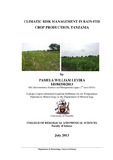| dc.description.abstract | Rain-fed crop production is one of the dominant farming practices in developing
countries and plays a major role in providing food and livelihoods for an increasing
world population. In recent years climate related risks on crop production has become
the centre of concern in rain-fed areas because losses from climate-related risks are
rising. Limited understanding of the local climatic-related risks compromise better
climatic risk management in rain-fed crop production system.
Site specific or tailored studies that address particular crop at a particular area have
shown to minimize climate-related challenges and uncertainty. For the sake of local
climatic challenges, this study carried out a study to identify local climatic risk, assess
the effect of those risks to crop and biomass yield and suggest methods to minimize
local climatic risks of groundnut production in central Tanzania.
The main objective of this study was to improve the understanding of agricultural
project managers and extension officers on the effect of local climatic risks, with the
aim to better manage climatic risk in crop production. To achieve the study objectives,
there were three distinctive components in this study. The first components was to
examine local climatic risks available in the study site, the second component
examined the impact of selected local climatic risk to biomass and crop yield, and the
third component explored options to minimize local climatic risk using climatic data.
In the first component, Instat statistical package was used to analyse local climatic
risk named planting date, raindays, length of the season, and dry spell length
variability including temperature extremes. In the second component, the Agricultural
Production Systems Simulator (APSIM) was used to assess the impact of different
planting dates to biomass and groundnut yield. In the third component, Statistical
package Instat was used to address options to minimize local climatic risks by
calculating the risks of replanting or crop failure and box plot analysis for different
planting date and seasonal length variability.
The analysis of the first component found that climate variability is a major challenge
and was measured by standard deviation and R-squared values. The second
component observed more yields to planting dates that has minimum variability. The
third component observed reduction of local climatic risks by up to 30% by changing
management practice (apply planting date with minimum variability).
This study concluded that local climatic risks are very unique and affect crops at
various stages of development. Local climatic risks if not well understood are
potential to decrease yield hence compromise efforts of increasing crop production
by farmers and other key stakeholders such at crop researcher, extension officers and
insurance companies.
Further studies are needed to identify multiple climatic risks with spatial analysis.
Analysis of the impact of individual risks should be done for each crop because each
crop impacted different by different risks. There is a need for further study on other
interventions on how to minimize local climatic risks to improve yield, and further
studies is needed on communicating local climatic risks with key stakeholders with
the aim to update new interventions to local farmers. | en_US |

